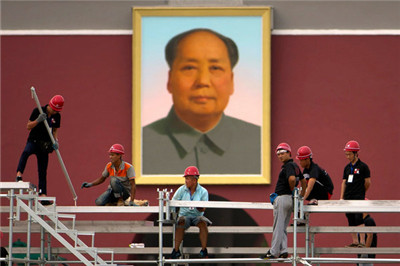(单词翻译:单击)
HONG KONG — China’s currency stabilized on Friday, ending a three-day plunge that shook markets globally during the renminbi’s steepest devaluation in decades.
香港——周五,中国货币汇率趋稳,结束了连续三天的下跌。这是人民币数十年来幅度最大的贬值,震动了全球市场。
For the first time since Tuesday, the country’s central bank set the official exchange rate higher — though only slightly — against the dollar.
中国央行调高了人民币兑美元的官方汇率,虽然幅度甚微,却是自周二以来的首次。

The renminbi responded by strengthening 0.1 percent, ending the week at 6.392 per dollar. Still, that meant the People’s Bank of China had effectively devalued the currency 4.4 percent. It was the steepest drop since the country’s modern exchange rate system was set up in 1994.
受其影响,人民币升值0.1%,以1美元兑6.392元人民币的汇率结束了这一周。然而,这还是意味着中国人民银行让人民币实际贬值4.4%。这是自中国1994年建立起现代汇率制度以来的最大幅度贬值。
The sudden decline added fuel to a global debate about currency wars. It also raised new concerns about whether Chinese leaders could manage the country’s huge but slowing economy as they pursue market-driven overhauls to the financial system, which remains broadly under state control.
人民币汇率的急跌,让全球有关货币战争的争论愈演愈烈,并让外界产生了新的担忧:中国领导人在争取对目前主要由政府控制的金融制度进行以市场为导向的改革,但这期间他们能否控制住该国庞大但却日渐放缓的经济?
China’s stock markets are still struggling after a sell-off that began in mid-June. The government took extraordinary measures to support share prices, including barring major shareholders from selling stocks and ordering state agencies to buy, with backing from state banks. But they had little lasting effect.
在经历了始于6月中旬的抛售后,中国股市依然举步维艰。政府采取了非同寻常的托市措施,包括禁止大股东出售股票,以及下令国家机构在国有银行的支持下购买股票。但它们几乎没什么持久的效果。
The renminbi’s fall should provide a modest boost to the country’s exporters, as the prices of their goods become relatively cheaper to overseas buyers. But officials at the central bank have denied that was why they pushed the currency down, saying instead that they wished to move closer to an exchange rate guided by trading.
人民币贬值应该会对中国的出口商起到一定程度的帮助,因为对外国买家而言,他们的产品会变得相对便宜一些。但央行的官员否认这是他们推动人民币贬值的原因,他们是希望更接近由交易引导的汇率。
Instead of ignoring movements in the currency market, the central bank said it would begin to use them as the reference point in its daily setting of the exchange rate. The renminbi’s reaction to this change, they said, was a “one-off” adjustment.
中国央行不再忽略货币市场的变化,而是表示将开始在每天制定汇率时,把它们当做参考点。他们说,人民币对这个变化做出的反应,是一种“一次性”调整。
The currency had been under pressure to weaken as China’s economy slowed. But the central bank kept it closely linked to the dollar, which had strengthened against most other major currencies because of the rebounding economy in the United States.
随中国经济放缓,人民币一直面临着贬值的压力。但中国央行一直让人民币钩住美元,而因为美国国内经济回升,美元相对于其大部分主要货币都升值了。
“China’s equities market crumbled this summer because its regulators were incapable of acting in the face of a bubble,” Daniel H. Rosen, a founding partner of the consultancy the Rhodium Group, wrote in a research note. China’s central bank “was determined not to repeat that mistake with the currency,” he added.
“今年夏天,因为监管机构在面对泡沫时没有能力采取行动,中国股市崩盘,”咨询公司荣鼎咨询(Rhodium Group)创始合伙人荣大聂(Daniel H. Rosen)在一份研究报告中写道。他接着表示,中国央行“下决心在货币问题上不再重蹈覆辙”。
By Friday, China had made clear it would allow the currency to move with the markets. But the central bank also showed it would not hesitate to step in if needed. And the renminbi’s daily swings are still capped at a rise or fall of 2 percent.
到了周五,中国明确表示将允许人民币汇率跟随市场变化。但央行也表示,如有需要,它将毫不犹豫地出面干预。人民币汇率的浮动区间依然被限定在上下2%。
The central bank set the exchange rate at 6.397 per dollar on Friday, a tiny 0.01 percent gain from Thursday’s market close. It remained steady around that level throughout trading on Friday, despite heavy volume, suggesting that the central bank was acting to keep the currency stable.
周五,央行制定的人民币兑美元的汇率是6.397,同周四的收盘价相比小幅上涨0.01%。在周五的整个交易期间,尽管交易量巨大,汇率始终稳定在这个水平上下,这表明央行正在采取行动,保持汇率稳定。


